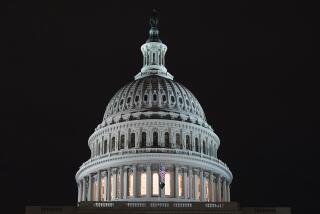Congress nears deal on payroll tax cut, unemployment benefits
Reporting from Washington — Despite discomfort in the GOP ranks, House and Senate negotiators were close to striking a deal that would extend a payroll tax break, continue unemployment benefits and ensure Medicare doctors do not see a pay cut this year.
Talks continued into the evening Wednesday as Republican and Democratic congressional leaders worked to present a package that could be voted on by week’s end – before lawmakers adjourn for a weeklong recess.
Without action, taxes would go up on March 1, unemployment benefits would end and doctors’ pay would be slashed by 27.4% -- politically toxic outcomes all sides hope to avoid.
Rank-and-file Republicans have found little to like in the package once GOP leaders announced earlier in the week they would drop their insistence that the tax cuts be paid for with spending reductions elsewhere.
Slight changes were being made to the unemployment insurance program to attract GOP votes, but Republican leaders said they had little choice but to drop their demand of paying for the tax break after Democrats showed little willingness to make the spending cuts Republicans wanted.
Several Republican lawmakers said even though they disapprove of the emerging compromise, they were reluctant to keep fighting. President Obama has continued to portray Republicans as blocking a tax break for 160 million working Americans. The GOP held firm on its position last year, and that left the party badly damaged in polls.
“One thing we know: December was a debacle,” saidSen. John McCain(R-Ariz.) “We don’t want to repeat that.”
Republican Rep. Pete Sessions of Texas, the chairman of the party’s campaign committee, who is working to keep the House GOP majority this fall, said he still thinks the payroll tax break is “a bad idea.” But he found value in resolving the issue.
“I think at some point the American people are looking to us to find a way to move on, move together,” Sessions said.
The contours of the deal would extend the payroll tax break, which trims 2 percentage points off the tax workers pay toward Social Security, through the rest of the year.
The $100 billion cost of the tax cut would not be paid for with Republican-led spending cuts or taxes on the wealthy as Democrats suggested. Instead, the lost revenue stream to the Social Security fund would be shored up with general fund revenue, which essentially adds to the deficit.
The other provisions in the package would be offset with a combination of new revenues and spending cuts.
The estimated $30 billion needed to continue long-term unemployment benefits would be covered partly by new revenues from leasing federal communication spectrum, which wireless providers are seeking as their services expand.
The remainder would come from a reduction in the government’s contribution to federal workers’ retirement accounts. Workers would be asked to contribute an additional 0.75% toward their retirement, phasing their current contribution of 0.8% to 1.75% over the next several years, according to aides familiar with the package.
Republicans had focused on making changes to the unemployment insurance program, which some in the GOP have said is a drag on the economy and keeps jobless Americans from finding work.
Under the deal, the unemployment program would see the guarantee of up to 99 weeks of benefits in the most hard-hit states reduced to 73 weeks by year’s end. Residents in most states would not qualify for that level of benefits, and would see about 63 weeks of unemployment aid.
At the same time, states would be allowed to drug test those seeking unemployment benefits if they had been fired for substance abuse or if their new jobs required drug testing. Advocates for the unemployed have resisted drug testing provisions and said most states already prevent drug offenders from qualifying for benefits. Furthermore, companies in industries that require testing provide the tests. The new provisions would open the door to broader state involvement if states decided to pay for such services.
Republicans lost their bid to require jobless Americans to work toward a high school diploma before they can receive unemployment insurance.
The estimated $20 billion cost of maintaining the Medicare doctors’ pay rates would come from cuts to health accounts, including one that would fund prevention and public health services under the new healthcare law, as well as another that would reduce the reimbursement rate for hospitals that incur debt from certain patients.
Boehner was hopeful Wednesday that the deal could be reached. A proposal would need to be made public by midnight to hew to the House rule that legislation generally must be posted three days before a vote.
“I think there is an agreement in principle, but there are a lot of details that are yet to be worked out,” he said Wednesday morning. “I’m hopeful that that’ll be wrapped up.”
Twitter.com/LisaMascaroinDC
More to Read
Get the L.A. Times Politics newsletter
Deeply reported insights into legislation, politics and policy from Sacramento, Washington and beyond. In your inbox three times per week.
You may occasionally receive promotional content from the Los Angeles Times.











